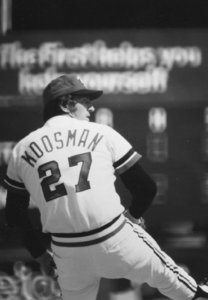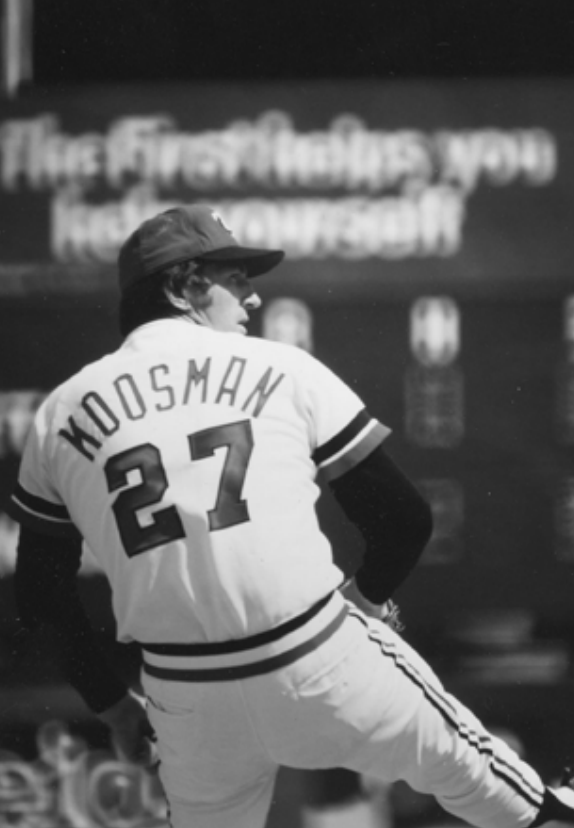September 30, 1979: Jerry Koosman reaches 20-win plateau for second time
 When Jerry Koosman took the mound at Metropolitan Stadium for the final game of 1979, a sense of déjà vu must have been felt.
When Jerry Koosman took the mound at Metropolitan Stadium for the final game of 1979, a sense of déjà vu must have been felt.
Three years before, he made good on his chance to achieve a milestone every starting pitcher aims for when the schedule begins: 20 wins. He’d finish that 1976 season with 21, but victories would soon be much harder to come by.
As the Mets franchise fell on hard times in the wake of the Tom Seaver trade, Koosman was too often on the short end of his team’s ineptness. A year after winning 20, he lost 20 – just among a handful in baseball history to have that dubious honor. Yet he finished with a 3.49 earned-run average, proof that he failed to get respectable run support.
The Seaver deal – on top of management’s indifference regarding free agency – indicated that if Koosman wanted to be on a winner, he’d best go somewhere else. After the 1978 season, in which his record was a meager 3-15 but his ERA under 4.00, the 35-year-old left-hander requested – and was granted – a trade to his home state.
Raised in Appleton, Wisconsin, where he spent much of his childhood working with his father and brothers on a farm, Koosman returned with a wealth of pitching experience in tow. As he wrapped up his first season in Minnesota, he became one of a handful to attain 20 victories in each major league. But this one had a different feeling.
“The first time I won 21 was a special experience,” Koosman said. “But any time you win 20 games when you’re pitching with a new ballclub is hard to beat. It’s just great. The guys just played super ball all year behind me.”1
Jerry was pretty superb at the outset of the ’79 season, showing he could adjust quickly to American League batters by winning his first seven decisions. And for a welcome change, he got plenty of runs from the Twins offense. But this early-season success was countered by a monthlong winless drought that saw him lose six times.
The roller coaster continued: he won four in a row, then lost four straight, then was victorious in six consecutive outings to bring his ERA down to 3.35. After dropping three of his next four decisions, the pendulum had seemingly swung in favor of a win streak when he notched his 19th at County Stadium in Milwaukee.
Koosman’s chance to lock up number 20 in his second-to-last start of the year was placed into the hands of reliever Mike Marshall. Protecting a 5-3 lead with one out in the eighth, Marshall let the Twins’ lead on the White Sox slip away before relinquishing the winning run in the 10th.
As was the case in 1976 with the Mets, Koosman had another shot at the milestone. But unlike ’76, he couldn’t rely on his next start if it fell through again. His team had something to play for too. A victory would ensure a winning record.
If Koosman and the Twins were to do it, they both would earn it against the team with the fourth-best offense in the American League and Koosman’s last victim.
The Milwaukee Brewers, a team stocked with young talent like Robin Yount, Paul Molitor, and Cecil Cooper, were concluding a second straight season of at least 93 victories and a runner-up finish in the American League East.
The 36-year-old Koosman pitched around potential trouble in the early innings. Despite allowing hits to the first two batters – Jim Gantner and Yount – Koosman escaped trouble with the help of his defense. Hosken Powell turned Dick Davis’s fly ball into a double play when he nailed Gantner trying to advance to third.
Koosman prevented a second-inning threat by picking off Jim Wohlford at first base. Lenn Sakata’s subsequent double was rendered less important – more so when he was left stranded. Gantner opened the third with a walk, but Koosman induced an inning-ending double play.
“In the first three innings I was wild and didn’t have my good stuff,” he said. “I really had to work to get things back together.”2
Milwaukee continued to threaten. But true to his veteran status, Koosman’s command held the Brewers in check.
The Twins, meanwhile, didn’t get a hit until the fourth. But in the fifth, the offense broke out. Three singles and a groundout against Brewer starter Lary Sorensen produced five runs, not to mention Sorensen’s ouster.
That was all the scoring the Twins would produce. And as it turned out, that would be more than Koosman needed.
He retired the side in the sixth and yielded only a single in the seventh. Koosman finished the eighth when he got Gorman Thomas looking for his 157th and final strikeout of the season. It was also a league-high 175th whiff for Thomas, who was quite displeased by the result. He flung his bat and helmet before being tossed by home-plate umpire Derryl Cousins.
“It was a good pitch,” Koosman recalled. “The pitch had the whole plate.”3
As he came out to pitch the ninth, the Met Stadium crowd sensed the moment. The paid attendance was barely over 10,000, but chants of “Koos … Koos … Koos” were clearly audible throughout the park and reached a crescendo as the inning played out.4
A 20th victory seemed all but certain. Koosman could do it in style: A 10th complete game and second shutout were within reach. The Brewers, though, threatened both of those. But thanks to the glove work of rookie third baseman John Castino, the shutout was kept intact. Don Money’s attempt at a leadoff hit was squelched when Castino backhanded Money’s grounder and threw across the diamond for the first out.
After catcher Ray Fosse legged out a triple, Castino’s defense came to Koosman’s aid once more. On a groundball by Wohlford, Castino trapped Fosse between third base and home and turned him into the second out, eliminating a runner from scoring position. Koosman then got Sakata to fly out to secure the 5-0 victory.5
“You go into a game like that knowing you have to put your best game on the line and hope things work out,” Koosman said.6
“When [he] got to the Minnesota Twins’ clubhouse,” wrote Ken Feaster in the Winona Daily News, “there was a present waiting for him from teammate Dave Goltz – a bottle of champagne.”7
Jerry had plenty of reasons to celebrate. He led all Twins players for 1979 with a 7.2 WAR (Wins above Replacement), which was also tied for the best among all American League pitchers; was fifth in strikeouts; and finished sixth in the American League Cy Young Award balloting. The blanking of the Brewers, the only time Milwaukee was shut out all year,8 lowered his ERA to 3.38.
Koosman lasted two more seasons in Minnesota. Although his first year with the Twins was his best, he followed up his 20-victory campaign with 16 wins and 149 strikeouts in 1980 while also serving an occasional role in the bullpen. The Twins sent Koosman to the Chicago White Sox at the trading deadline on August 30, 1981. After three years in the Windy City and two more after that in Philadelphia, Koosman retired with a record of 222-209, a 3.36 ERA, 140 complete games, 33 shutouts, and a WHIP of 1.26.
Not bad for a former Minnesota farm boy.
Sidenotes
If not for Koosman’s pitching, along with Castino’s determination to preserve the shutout in the ninth, the Brewers would have become only the second team to go an entire season without being shut out. The New York Yankees did it in 1932.
Koosman set a team record with 14 pickoffs when he picked off Wohlford in the second.
Sources
In addition to the references cited in the Notes, the author consulted Baseball-Reference.com and Retrosheet.org.
Notes
1 Ken Feaster, “Koos Praises Castino,” Winona Daily News, October 1, 1979: 8.
2 Ken Feaster, “Jerry Koosman Pockets 20th Victory,” Winona Daily News. October 1, 1979: 8.
3 “Jerry Koosman Pockets 20th Victory.”
4 “Koos Wins 20 – Ponders ’80 at Season End,” Minneapolis Star. October 1, 1979: 48.
5 “Koos Praises Castino.”
6 “Jerry Koosman Pockets 20th Victory.”
7 “Koos Praises Castino.”
8 Bob Fowler, “Koosman Wins 20th in 1979 Finale,” Minneapolis Tribune. October 1, 1979: 23.
Additional Stats
Minnesota Twins 5
Milwaukee Brewers 0
Metropolitan Stadium
Bloomington, MN
Box Score + PBP:
Corrections? Additions?
If you can help us improve this game story, contact us.


